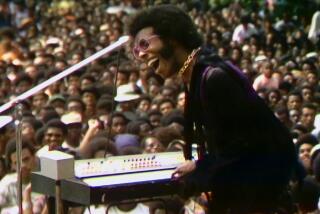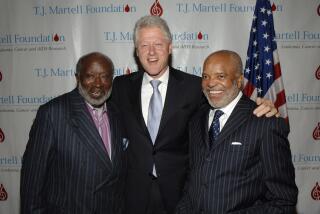Clement Stone, 100; Self-Made Millionaire, Philanthropist
W. Clement Stone, a onetime Chicago newsboy who turned a $100 investment into a multibillion-dollar insurance business and enthusiastically preached the gospel of achieving success through a “positive mental attitude,” has died. He was 100.
Stone, who gave more than $275 million to various philanthropies and was a major Republican Party supporter who donated more than $5 million to Richard Nixon’s presidential campaigns, died of natural causes Tuesday at a hospital in Evanston, Ill.
From a single agency he founded in Chicago in 1922, Stone by the mid-1930s had built his Combined Insurance Co. of America into a major force in the industry.
In 1982, Combined merged with Ryan Insurance Group and five years later, when its name was changed to Aon Corp., Stone became chairman emeritus. Last year, Aon reported total revenues exceeding $2 billion.
Short and stocky, with slicked-down hair and a pencil-thin mustache that he kept perpetually black, Stone cut a jaunty figure with his wardrobe of colorful bow ties, pinstripe suits and gold cufflinks the size of quarters.
Stone once drove a gold Cadillac and he continued to smoke Cuban cigars, which he had stockpiled in pre-Fidel Castro days.
But as much a trademark as his flamboyant appearance was his ebullient, think-positive attitude.
“He’s probably the most positive-thinking person I ever knew,” the Rev. Robert Schuller, a 40-year friend who will speak at Stone’s funeral in Evanston on Friday, told The Times on Wednesday.
“He was also a great believer in possibilities, and was one of the first persons to believe in my dream of a Crystal Cathedral,” Schuller said. “Without his major seven-figure gift, this building would not be standing here today.”
Members of Stone’s insurance sales force were schooled in what Stone called PMA: positive mental attitude.
They were instructed in “how to keep a smile in the voice” and when to make eye contact with a prospective customer.
And they were encouraged to declare their PMA daily with catch phrases such as, “What the mind can conceive and believe, the mind can achieve” and “Do it now.”
At sales meetings around the country, Stone would stand on stage and ask his audience, “How do you feel?” They’d respond with the PMA mantra: “I feel healthy. I feel happy. I feel terrific.”
Stone, who began developing his self-motivation philosophy during his early days selling insurance, would pass out coins bearing his likeness on one side and on the other, the words “Study. Think. Plan. Act.” His sales stationery read, “Hit the target. Aim higher.”
Stone’s self-motivation philosophy was influenced in part by Napoleon Hill’s 1937 book “Think and Grow Rich.”
Stone later collaborated with Hill in writing the 1960 book “Success Through a Positive Mental Attitude.” He also wrote “The Success System That Never Fails” and co-wrote, with Norma Lee Browning, “The Other Side of the Mind.” And he was editor and publisher of “Success Unlimited,” a monthly magazine founded in 1954 and sold in 1985.
“He was a remarkable individual who could motivate and enthuse individuals and audiences to overcome adversity, to succeed and to give back to the world,” Warren Hendriks, Stone’s former vice president of corporate relations, told The Times on Wednesday. “Just being around him was a huge motivation.”
Throughout his life, Stone maintained that any man can become wealthy, “no matter how poor his start in life.”
His early days read like the Horatio Alger stories he devoured as a youth.
Born in Chicago on May 4, 1902, Stone was not quite 3 when his father, a gambler, died and left his family impoverished.
By the time he was 6, Stone was helping his dressmaker mother pay the rent by selling newspapers in his south-side neighborhood. By 13, he owned his own newsstand.
At 14, he worked summers helping his stepfather in a small insurance office and at 16, after his mother moved to Detroit to establish another insurance office, he began making cold sales calls in Detroit’s Dime Bank Building.
When he was 20, Stone used $100 in savings to launch his own insurance agency in Chicago. Eight years later, in 1930, he had 1,000 salesmen around the country working for him. He also owned a home in Evanston and was making payments on a pair of big Lincolns and a 30-foot cabin cruiser.
Although the country was in the throes of the Great Depression, Stone wasn’t worried.
“Money didn’t mean anything.... I knew I could go out and make it,” he told the New York Times in 1971.
Looking back, he said, the Depression was the “best thing that happened” to him: “It forced me to develop good work habits and be more scientific in training men so I could pay off my debts.”
Stone dropped out of high school in Detroit to spend more time selling insurance.
He later obtained his diploma by taking night classes at the Chicago YMCA’s Central High School.
At 19, he attended the Detroit College of Law. But he dropped out after a year when he realized he couldn’t make a large enough income as a lawyer “until I was at least 35.”
He also attended Northwestern University from 1930 to 1932 and, though he never graduated, he eventually received 20 honorary degrees.
Until recently, Stone continued to devote his time and money to philanthropy, civic activities and political causes.
Over the years, he donated millions to numerous civic and charitable groups, including the Boys & Girls Clubs, with which he had a 50-year involvement.
Republican Party candidates also benefited greatly from his largess.
Stone became a close friend of Nixon in 1964 after they met as members of the national board of the Boys’ Club of America. Stone reportedly gave more money to Nixon’s 1968 campaign than anyone else, and he said during Nixon’s 1972 reelection campaign that he was determined that the president “wouldn’t lose because of a lack of funds.”
“Clem was one of the first influential Americans to believe that my father could make the impossible comeback to become president,” Julie Nixon Eisenhower told the Chicago Tribune on Wednesday.
“He was truly an inspiration to the president.”
Stone, who later donated $2 million to the Richard Nixon Library & Birthplace in Yorba Linda, continued to support Nixon after his resignation in 1974, believing that Nixon “is going down as one of the greatest presidents that we ever had.”
Stone is survived by his wife of 79 years, Jessie; a son, Norman; 12 grandchildren; and 13 great-grandchildren. A son, Clement, and a daughter, Donna, are deceased.
More to Read
Inside the business of entertainment
The Wide Shot brings you news, analysis and insights on everything from streaming wars to production — and what it all means for the future.
You may occasionally receive promotional content from the Los Angeles Times.










